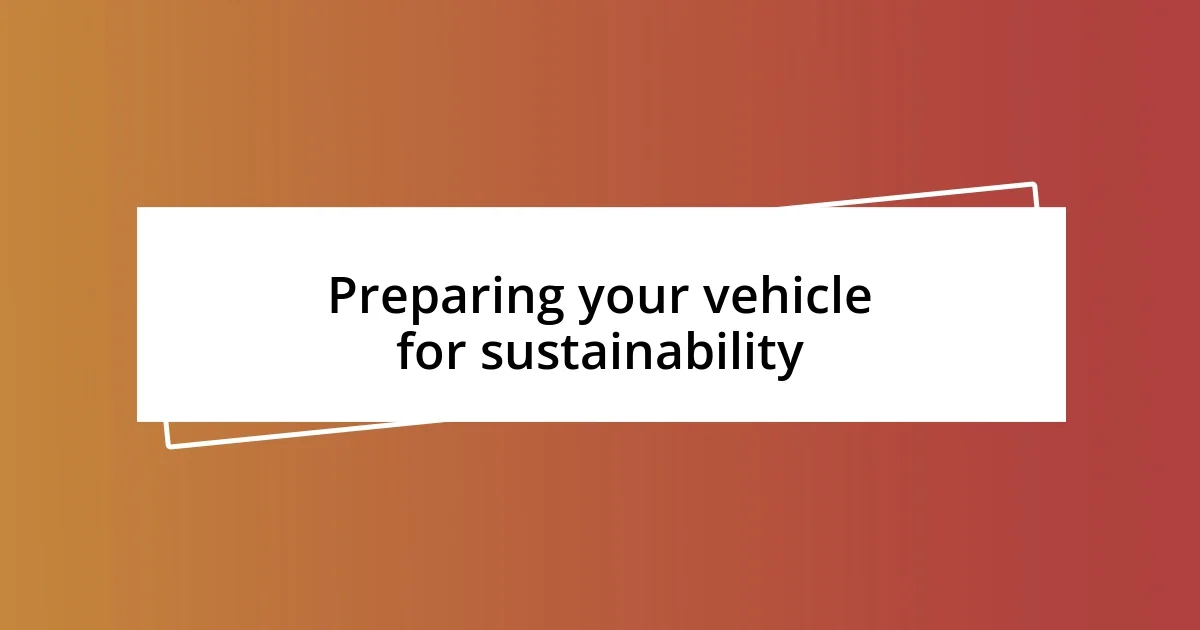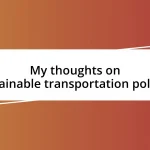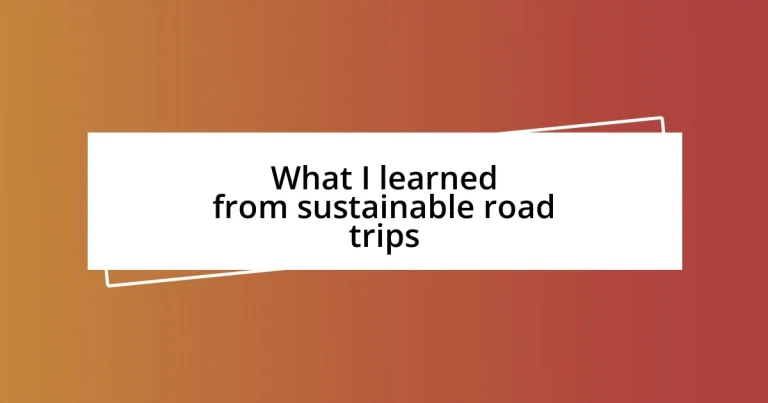Key takeaways:
- Experiencing sustainable road trips fosters deeper connections with local communities, enhances mindfulness, and leads to enriching adventures through genuine interactions and mindful practices.
- Preparing your vehicle for sustainability through maintenance, tire pressure checks, and the use of biofuels can significantly reduce your environmental impact while traveling.
- Choosing eco-friendly accommodations and planning low-impact itineraries promotes responsible travel, supporting local economies and increasing awareness of environmental stewardship.

Understanding sustainable road trips
Sustainable road trips are all about minimizing our ecological footprint while still enjoying the journey. When I first embarked on a road trip focused on sustainability, I was genuinely surprised by how enriching the experience was. Choosing a route with plenty of natural beauty not only felt good for the planet, but it helped me reconnect with nature in a way that flying or driving along heavily trafficked highways simply couldn’t match.
One memorable experience was when I camped at a small, eco-friendly site nestled in the mountains. By opting for local, organic produce from nearby farms, I felt more connected to the region and its people. It got me thinking: isn’t it amazing how our travel choices can support local economies and promote a healthier planet?
As I navigated through different landscapes, I noticed how much more aware I became of my surroundings. I cherished the quiet moments in nature, from the soft rustling of leaves to the distant sounds of wildlife. This oscillation between travel and mindfulness made me question the very essence of adventure: can we truly enjoy the journey if we’re not considering the impact we leave behind?

Benefits of sustainable travel
Sustainable travel has an array of benefits that enhance our journeys while caring for the planet. One of the most rewarding aspects I’ve found is the sense of community that develops when engaging with local cultures. Visiting small towns and interacting with residents often leads to memorable conversations and cherished memories, like the time I shared a meal with a local family who invited me into their home. Their warmth was infectious, and it highlighted how sustainable travel fosters genuine connections that transcend traditional tourist experiences.
Additionally, choosing eco-friendly accommodation often comes with perks I hadn’t initially considered. For instance, during one of my trips, I stayed at a green lodge that prioritized sustainability not just in its practices but also in its offerings. I participated in a workshop on traditional crafts, which not only deepened my appreciation for the culture but also provided a unique way to contribute to the local economy. It’s amazing how sustainable travel can turn ordinary trips into enriching adventures filled with learning opportunities.
Moreover, traveling sustainably encourages us to be more mindful of our choices. On a recent trip, I opted for a vehicle that reduced emissions, which sparked curiosity in fellow travelers. We exchanged stories about the impact of our travel habits, and it became clear that a collective consciousness is forming around sustainability. It’s fulfilling to see how our individual actions can inspire a ripple effect, fostering a community dedicated to making a positive impact on the world.
| Benefits | Examples |
|---|---|
| 1. Connection to Local Communities | Enjoying authentic experiences and meals with residents |
| 2. Unique Learning Opportunities | Workshops and activities that promote local traditions |
| 3. Enhanced Mindfulness | Becoming aware of environmental impacts through conscious choices |

Preparing your vehicle for sustainability
When preparing your vehicle for a sustainable road trip, there are several proactive steps that can significantly reduce your environmental impact. For me, I always start by making sure my tires are properly inflated. This simple act improves fuel efficiency and can even make driving feel smoother. Additionally, performing an oil change before hitting the road not only keeps the engine running efficiently but also helps reduce harmful emissions.
Here are a few essential tips for ensuring your vehicle is ready for sustainability:
- Check tire pressure: Properly inflated tires lead to better fuel efficiency.
- Regular maintenance: Ensure oil and filters are changed before your trip.
- Lighten your load: Remove unnecessary items from your trunk to improve fuel economy.
- Use eco-friendly car products: Opt for environmentally friendly cleaning supplies for your vehicle.
- Consider biofuels: If available, using biofuels can further reduce your carbon footprint.
I remember one trip where I decided to swap my usual gasoline for biofuel at a small station I found along the way. I felt a surge of satisfaction knowing I was making a more environmentally friendly choice, which also sparked conversations with other travelers filling up their tanks. Sharing those moments and insights felt like building a community around sustainable practices, reminding us all that every little effort can make a big difference.

Choosing eco-friendly accommodations
Selecting eco-friendly accommodations is pivotal for anyone passionate about sustainable travel. During one of my trips, I discovered a charming bed-and-breakfast that utilized solar panels for energy. Not only did it feel right to support such an establishment, but sleeping in a solar-powered room also gave me a cozy sense of contributing to something greater than just a night’s stay. Isn’t it rewarding to know that our choices can help reduce our carbon footprint?
I always pay attention to certifications that indicate a place is genuinely eco-friendly. For example, a hotel I once visited was recognized by the Green Key eco-label. This made a significant impression on me as I learned about their comprehensive recycling program and commitment to local sourcing. It sparked curiosity about how many other accommodations prioritize sustainability in unseen ways. When you dig deeper, it often leads to discovering small businesses that truly care for our planet. How can we not celebrate that?
Another highlight from my travels was the simple joy of connecting with hosts who are frequently passionate about their sustainable practices. I stayed in a quaint cabin run by a family committed to wildlife conservation. Hearing their stories about restoring the surrounding habitat brought a new dimension to my stay. It left me thinking—how often do we overlook the powerful stories behind the places we choose? Those connections make eco-friendly travel not just sustainable but genuinely enriching.

Planning a low-impact itinerary
When planning a low-impact itinerary, I find it invaluable to incorporate shorter driving distances between destinations. This not only reduces fuel consumption but also allows for detours to local, off-the-beaten-path attractions that encourage exploration and connection with the environment. On one trip, I took an unexpected backroad and stumbled upon a hidden waterfall, reminding me of the beauty that lies beyond the main highways.
I also prioritize developing an itinerary that includes stops at sustainable, community-focused restaurants and local markets. This approach not only supports small businesses but also offers the chance to enjoy fresh, locally sourced meals. I remember the warmth of dining at a family-run cafe that boasted a farm-to-table concept. It felt great knowing my choice contributed to the local economy while savoring delicious dishes made from ingredients grown just a few miles away.
Finally, incorporating nature activities into your travel plan can lead to a more fulfilling experience while promoting environmental stewardship. I often carve out time for hiking or visiting wildlife reserves, which not only deepens my appreciation for natural ecosystems but also instills a sense of responsibility for their preservation. For instance, hiking through a forest, I felt a profound connection to the land and a renewed commitment to protect such spaces for future generations. Isn’t that the essence of sustainable travel—to create memories while honoring our planet?

Reflecting on lessons learned
Reflecting on my sustainable road trips has really opened my eyes to the importance of mindfulness in travel. I remember an instance when I was camping in a national park and decided to leave no trace. It was a simple act, but packing out my waste made me feel deeply connected to the land. This commitment to leaving things better than I found them sparked a deeper sense of responsibility in how I travel and engage with nature.
One particularly memorable trip taught me the value of slowing down and savoring moments rather than rushing from one destination to another. On a whim, I spent an extra day at a small lakeside village, engaging with local artisans and their crafts. The stories behind their work were not merely about souvenirs; they were heartfelt reflections of their heritage. I realized that every place holds a wealth of insight if we simply take the time to listen—how often do we allow ourselves that gift while traveling?
I’ve also learned that meaningful interactions with fellow travelers can underscore the lessons of sustainability. During a shared campfire one evening, we exchanged ideas about reducing waste, and I was moved by a woman who made a habit of composting while on the road. Her passion inspired me to adopt more eco-friendly practices in my own life, even beyond travel. Isn’t it fascinating how connections can shift our perspectives and inspire us to be better stewards of the Earth?












